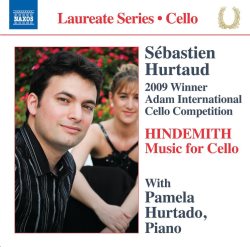| 
|
Paul HINDEMITH (1895-1963)
Three Pieces for Cello and Piano, Op. 8 (1914-16) [23:25]
A frog he went a-courting – Variations on an Old English
Nursery Song (1941) [5:15]
Sonata for Solo Cello, Op. 25, No. 3 (1922) [9:27]
Sonata for Cello and Piano (1948) [23:05]
Sebastien Hurtaud (cello), Pamela Hurtado (piano)
rec. 11-12 Jan 2013, Concert Hall, Wyastone Leys, Monmouth.
NAXOS 8.573172 [61:28]
Rubbished by Joseph Goebbels as an ‘atonal noisemaker’, to the contemporary ear Paul Hindemith sounds quite tonal, thoroughly German and pricked with sardonic humour. With much of his music grounded in Bach’s counterpoint, his compositions encompass a coherent wholeness. Whereas most music lovers find Hindemith’s compositions acerbic and dry, Glenn Gould wrote that Hindemith’s art represented a ‘repose’ that was ‘the true amalgam of ecstasy and reason’. Instantly, and without interruption, Hurtaud and Hurtado expose this fraught and sometimes tender dynamic between passion and repose. With similarities to Hanns Eisler and the wonderful Hans Werner Henze, Hindemith is an interesting composer worthy of numerous recordings and serious listening.
Hindemith’s Three Pieces for Cello and Piano, Op. 8 is a remarkable work if only because it manages to delve into the innermost dwellings of the heart whilst remaining free from the ooze of excessive, gushing sentimentality. In the final movement – which is not unlike the Scherzo from Britten’s Cello Sonata Op. 65 – a sense of frenzy and humour merge before the piece lifts and sings exultantly. Hurtaud’s entrancing imagination helps realise the depth and dexterity of this piece. Hurtaud plays with the ‘Gofriller’ Stephan von Baehr cello and what Mstislav Rostropovich says about the muscularity of the cello itself befits both Hindemith’s sound and Hurtaud’s style: ‘The cello is a hero because of its register - its tenor voice. It is a masculine instrument, whereas the violin is feminine because of its soprano pitch.’ Indeed, when the cello enters, the listener feels the sinewy, yet subtle strength of both the instrument and piece.
A frog he went a-courting – Variations on an Old English Nursery Song is an obscure piece which skips and carouses. This punchy number is played with real personality. Unflagging energy and apt impetuosity render this popular song inquisitive and somewhat rhetorical, but not in a stuffy or humdrum way. Fervour and vitality impart a delightfully childish spirit to this piece.
Hurtaud gives Hindemith’s Sonata for Cello, Op. 25, No. 3 a dark and introverted feel. The composer carefully considered the instrument’s ‘physiology’ and in so doing established a dynamic relationship between the process of execution and intended expression. Consequently this piece (consisting of five short movements) successfully negotiates the fraught tensions between the organic and the mechanical natures of art. Perhaps this in itself is a commentary on the war-torn environs that surrounded Hindemith at the time of composition. Beginning with sharp angular sounds, strained double-stops and dramatic register shifts, it enters a long central movement (Langsam) which boasts a languorous melody which at once succumbs and resists. This ends with a deep gnawing chord sequence, lyrical treble lines and uneasy pizzicato. Here is music that carries a sense of unease and incompleteness. Hurtaud performs with maturity and intelligence, conveying the oppressed emotions which both cause friction and glimpse frivolity.
Together again for the Sonata for Cello and Piano (1948), Hurtaud and Hurtado demonstrate their instinctive inner ear, often seemingly sparring with each other. They empty their musical pockets as they deliver convincing and gripping performances.
Hindemith regarded the composer as a craftsman who he expected to know the harmony, counterpoint and all the minutiae of his craft. He believed that as craftsman, the composer should produce music to meet social needs, rather than as an artist composing to satisfy — or indeed pacify — the quandaries of his soul. Accepting and following these demanding specifications and intentions, yet with a personal and contemporary flavour, these two players deliver memorable performances which are eloquent and exacting in their adherence to and independence from Hindemith’s music.
If you are interested in Hindemith you might like to note that, BBC Radio 3’s ‘New Generation Artist’ Leonard Elschenbroich plays Hindemith’s Cello Sonata online. Also there’s a yearly festival of Hindemith's music held at William Paterson University in Wayne, New Jersey.
Lucy Jeffery
 |
 |
|



 All Nimbus reviews
All Nimbus reviews








